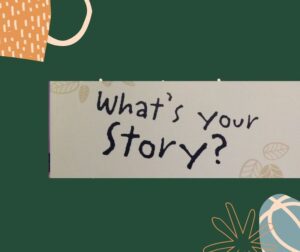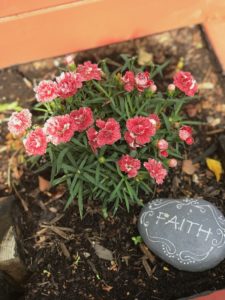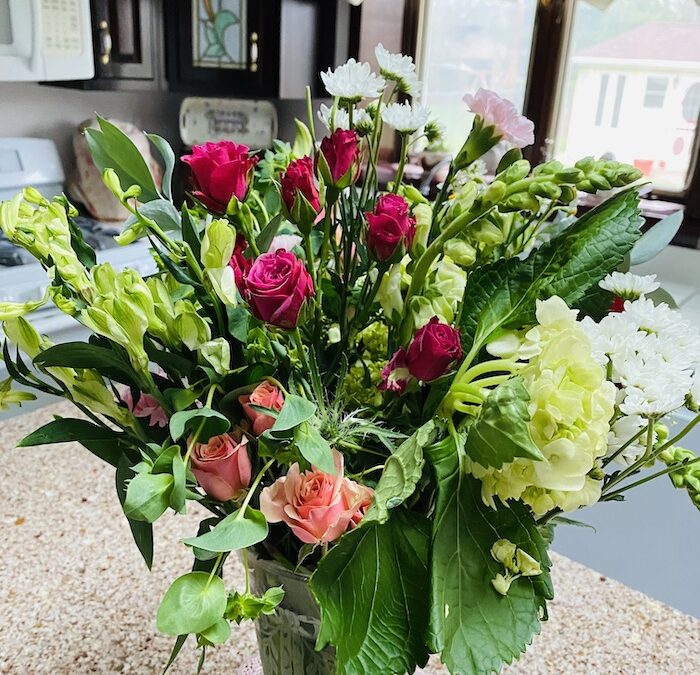Podcast: Play in new window | Download
Clear Your Thinking & Feel Great
Creating headspace is so important. It means having clarity to think, function, and communicate well. It means one is able to read well and retain the material. Or it is having a thought that turns into a behavior that is a positive one. Headspace allows us to enjoy our days and keep from procrastinating. When we have good headspace we can think abstractly.
A few months ago I had a hip replacement. When I returned home a few hours after the surgery I was able to move, talk, and think fairly well, but it was obvious in the days that followed that I still had a “med” head. Yes, medication had slowed me down physically, as well as, mentally. I remember looking at the list of medications and the time schedule, but so happy my daughter was there to monitor it. I was conscious of my movements so that I won’t pull myself out of place, but I was definitely not totally clear thinking.

This 6-year-old helped me recover.
My attention span wasn’t as long as normal either. I couldn’t get into reading a book or having deep conversations. The medication and anesthesia were still in my system. As I came off of medications in the weeks that followed, there was a change indeed. I began to move more easily, and clarity in my thinking returned. I was able to focus well on Sudoku puzzles and enjoyed picking up a magazine or two. My desire to connect and be productive picked up immediately. As physical therapy went on, I was able to drive, fulfill chores on my own, and get back into the office. I gained the confidence to move ahead.
Medication however is not the only thing that brings on a fog into our thinking. Often we have that fog in our minds when we are dealing with pain, grief, losses, or failing relationships. So I plan to address some of these issues and suggest a few ways to handle them.
Let’s start with pain. Pain comes into our lives in any number of ways. We stub a toe, twist an ankle, have arthritis in our wrists, or suddenly are attacked by a back spasm. We may have fallen and are recovering from pain in any number of places. The pain distracts us and we try to deal with it. We may see a doctor, get on meds, or try to exercise it away with physical therapy. It takes more time than we expect to heal and distracts us from doing all the things we want to do or normally do.
Pain is real and many people suffer on a regular basis. The medications one takes can even cloud the person’s thinking more. So when you are dealing with pain, give yourself some space and consult others if you have a major decision to make. Team up with people who have the skills or ability to help you. Asking for rides like when I was coming out of surgery was a given. I was not able to drive and had to be humbled. Pain sidetracks everyone. 
Next is grief. Grief is something everyone deals with in a different way. Often losing someone comes unexpectantly and there was no goodbye exchanged. Having a loved family member die is a void that is dealt with differently by each person. Some people keep repeating That may leave a big hole and a lack of closure for a long time. People around are not sure whether to bring up the situation and talk about it or avoid it. There may be silence when one really has the need to discuss the loss. If you are a person who has lost a family member let others around you know that you want to talk about the loss—that you need to hear yourself say the things that keep bouncing around in your head. Otherwise, people may be silent.
Of course, grief comes to us in a number of ways. We can lose a pet that we are attached to for many years and that companionship just can’t be replaced. That pet that kept you happy and chuckling isn’t around for you. I recall when our Rosy died, I’d find a toy of hers tucked under a chair. It was just another reminder of the joy she brought to me. I thought of how I could honor the time we had with her and added something special to our garden. I also gathered her medals and strung them together in a decorative way for our Delight Den 3 season house. I gave some of her things to another person who could use dog blankets, beds, toys, and bowls.
Losing a job is another big reason for grief. Layoffs, pandemics, and other situations may be problematic. Something that has given a person a meaningful purpose for a long time is suddenly gone. The income is gone. Getting your mind wrapped around what step to take next may be rather difficult. Be sure to share with others your needs. It is not a time to be embarrassed and people may give you insights and leads you could follow up upon.

Small moments can lift us up and give us hope!
If you are intentionally retiring make sure you have specific things to do. Volunteering your time in the community, helping at church, connecting with friends, taking time to make short trips, learning to play an instrument, or whatever hobby you like may make the transition awesome.
Even if you are changing jobs it is wise to create a few days in between to catch your breath or unwind. We see this is often the case when one finishes a semester of school in June and doesn’t need to jump into another curriculum filled with syllabuses and requirements in Fall. It may be good to take a few weeks off and read a book of fiction and jog through the neighborhood.

Faith & Hope are valuable during difficult moments!
In summary
- We need to create headspace during times of taking medications or recovering from medical issues. Recognizing the need will actually help you recover better.
- We need to recognize the need for headspace when we are enduring pain —a toothache, earache, broken bones, post-surgery, or even a simple cut that is distracting us from our routines and/or driving. Knowing the pain is temporary is a great mindset.
- When one is out of a job, it may be time to consider learning a new skill or connecting with others. It may be a blessing in disguise. You may meet new friends, develop new interests, and even make your commute easier.
- When we have lost a family member, a pet, or a relationship, now is the time to recognize them somehow. Perhaps plant a tree in their honor, donate in their name, or talk with a counselor about the loss. Recall the good times and gather pictures you enjoy.
- In times of a divorce, there is a shift in the people and the places you may have enjoyed. Now is the time to make that shift with a smile on your face and stay connected. Isolation is dangerous and makes one even sadder. Don’t criticize or blame. Accept the situation and move forward.
- Finally, it is essential to keep our thinking clear by recognizing who we connect with, the purposes for getting up every day, and looking for positive things to stay involved in.
- Changes are happening in all respects and all the time. Although they may not always be big changes they happen and call us to shift our thinking.
Learn who are the people on your team. Those that you support and those that support you. Enjoy this week and move ahead. I look forward to connecting again in two weeks. Please share this podcast with other people who may help.

